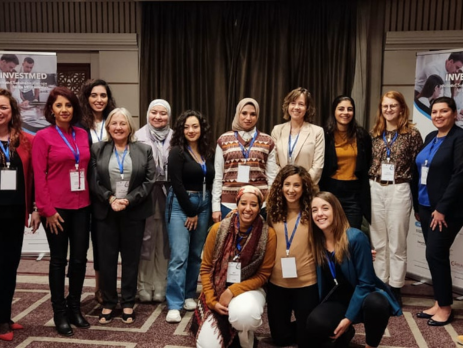The culmination of the Investmed project, initiated by the BusinessMed Organization and funded by the European Union, marked a significant milestone in the Tunisian capital, Tunisia. Launched three years ago, this endeavour aimed to elevate the business and artistic landscapes across Euro-Mediterranean countries, fostering job opportunities and economic growth, particularly for youth and women. The project also focused on bolstering entrepreneurial initiatives and sustainable businesses, creating a conducive environment and facilitating market access.
Since its inception, the European Union has allocated over 3 million euros to finance Investmed, part of an 18-project initiative with a total financing cost of 180 million euros. This injection of funds significantly contributed to fortifying investment prospects and establishing projects that tackled global challenges like climate change and promoted green transformation.
Jehane Boutaiba, Investmed Project Manager and Secretary General of the BUSINESSMED Alliance, underscored the project’s goal of addressing economic and environmental challenges. Spanning Egypt, Lebanon, Tunisia, Spain, and Italy, Investmed aimed to empower youth and women, particularly in Micro, Small, and Medium Enterprises (MSMEs). The project’s focus involved training MSME employees for enhanced competitiveness while fortifying public authorities to aid in accessing and safeguarding intellectual property rights.
Boutaiba highlighted the hurdles MSMEs face in the Mediterranean region, emphasizing the necessity for innovative solutions to ensure their growth and sustainability. She pointed out that aligning economic activities with environmental conservation could offer promising avenues to overcome these challenges, benefiting the region’s economy and environment.
Alaa Ezz, Secretary General of the Federation of Chambers of Commerce and Confederation of Egyptian European Business Associations (CEEBA), emphasized the collaborative essence of the INVESTMED project. The collaboration between Chambers of Commerce in Alexandria and Mediterranean Federations, alongside Egyptian partners from various Mediterranean countries, operated under the EU’s auspices. Their primary objective was to support budding entrepreneurs, innovative ideas, and micro-projects, with four projects receiving a total funding of 20 million euros.
Ezz outlined the project’s mechanics, detailing the selection of viable ideas and small projects through a rigorous technical committee. Selected projects received support via technical aid or access to business incubators established at the Red Sea level. These incubators were also connected to various funding sources from the European Union, European financing bodies, and the European Construction Bank within the cross-border cooperation program framework.
Moreover, Ezz highlighted the scope of the INVESTMED project, which united partners from Egypt, Tunisia, Lebanon, Italy, Greece, and Spain. This collaboration aimed to foster alliances between entrepreneurs, cultivating cross-border companies at an estimated cost of approximately 5 million euros.
At the conference, Wael Al-Rashidi, an expert advising participating entrepreneurs, shed light on the project’s focus areas. Most projects centred on the green and blue economies, handicrafts, or the creative and cultural sectors. Recognizing that many participants lacked market entry expertise, business incubators were crucial in training them in strategic market entry and risk mitigation strategies.
The closure of the Investmed project signifies not just the culmination of a financial endeavour but also a testament to cross-border cooperation, fostering innovation, and creating sustainable economic opportunities across the Euro-Mediterranean region.

